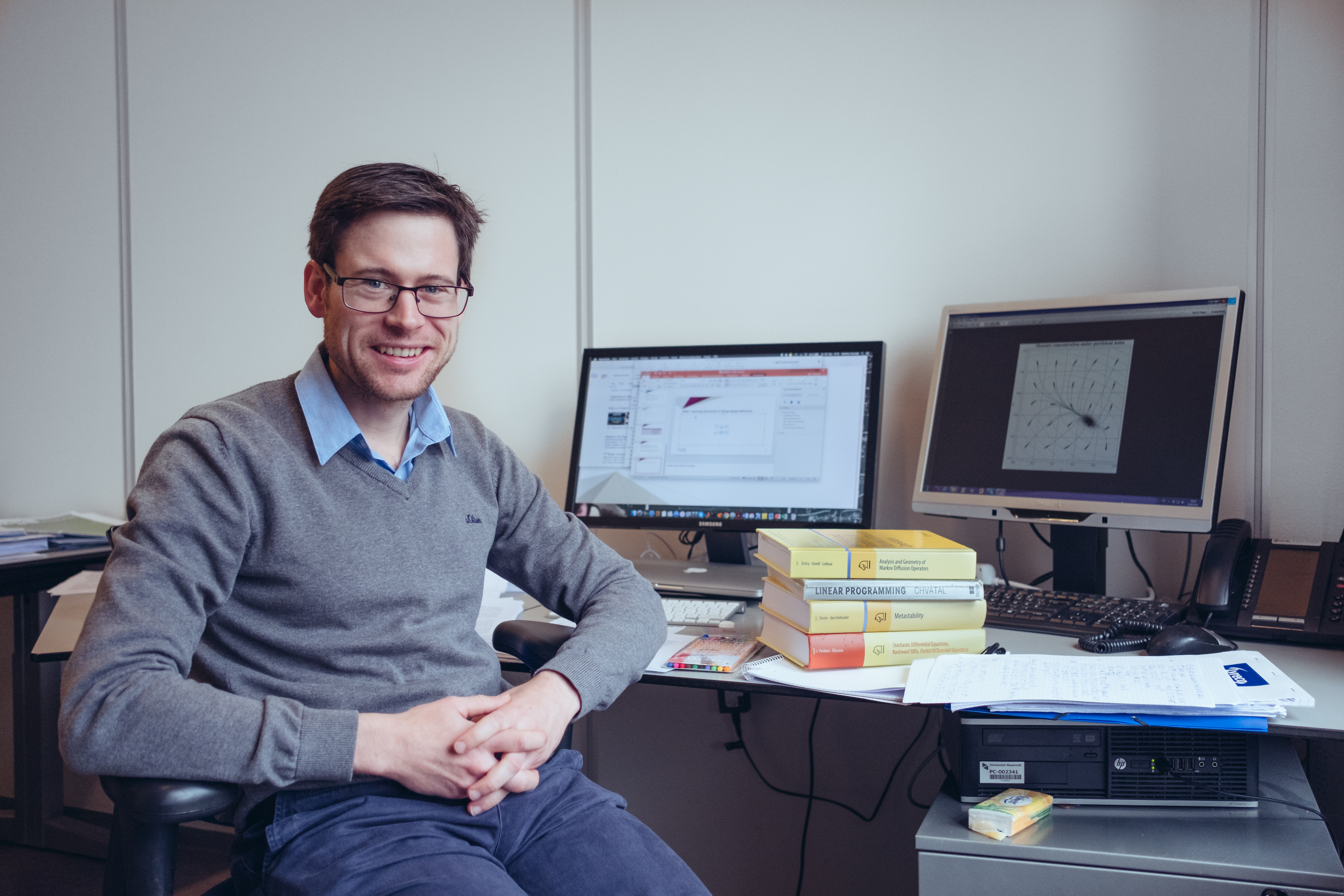Game on: UM to lead game theory network
If further proof were needed that Maastricht University has become “one of the leaders in the field” for game theory, a “very surprising” email that Mathias Staudigl received in June might just offer it.
The message came from COST, European Cooperation in Science and Technology, announcing that it was bestowing a coveted Cost Action grant on Staudigl, assistant professor of game theory and operations research at the School of Business and Economics, and his co-applicants. The four-year award, worth some 500,000 euros and supported by the EU Framework Programme Horizon 2020, will facilitate the creation of the European Network for Game Theory (GAMENET), with Maastricht University as its leader.

The award is intended, according to COST, as “a flexible, fast, effective and efficient networking instrument for researchers, engineers and scholars to cooperate and coordinate nationally funded research activities. COST Actions allow European researchers to jointly develop their own ideas in any science and technology field.”
Collaborators far and wide
It’s still early days for GAMENET, which will bring together disciplinarily diverse scholars including applied mathematicians, operations researchers, economists and computer scientists. They’re a geographically diverse lot, too. But when you ask Staudigl – who came to UM two years ago from Bielefeld University “because of Maastricht’s strong reputation in game theory” – how many universities will participate, he laughs and says it would be easier to count the countries.
“In two months, we’ve had 15 countries – out of 25 possible in the EU – sign the memorandum of understanding. We also have Singapore, the US and Canada, and I just received an inquiry from Australia. I hope to have 24 countries when we start officially on 18 October this year.” Closer to home, Staudigl’s GAMENET collaborators include SBE colleagues Hans Peters, Matthias Mnich, Janos Flesch and Dries Vermeulen.
Despite the challenges of working with so many scholars around the world, there’ll be no hanging around, according to the man whose GAMENET title is, appropriately enough, Action Chair: “We’ve already organizing, and we already have some ideas for conferences next year.”
He adds: “We have one working group on the algorithmic aspects of game theory and mechanism design, with concrete applications in routing and traffic engineering; we have a working group on learning dynamics and optimization theory; we will collaborate with the telecommunications industry, and we have a working group on fundamental methods in stochastic games – pure theory, so to speak.”
Viennese roots
Staudigl, a mathematician, comes by his interest in game theory honestly.“I did my studies in Vienna, where game theory was created by John von Neumann and Oskar Morgenstern. When I was a graduate student, the mathematics and economics faculties [of the University of Vienna] joined and created a new university at the Oskar-Morgenstern-Platz, and game theory was one of the main drivers. I was focusing on game theory by the time I was writing my master’s thesis, which is not standard for a mathematician, because it’s way too applied. I was a postdoc in a research group of mathematical biology, and then a postdoc at economics faculties – so I know both sides of the world, so to speak,” he observes.
While nearly all scholars can point to the interdisciplinary nature of their work, game theory is a particularly good place to cross boundaries. “It shows how effective mathematical tools can be for tackling many important issues independently of the context where they appear. It’s a common set of tools, and it applies to many things. That’s what’s most fascinating to me. I see it as the structure behind the arguments and the theories and the models,” Staudigl says.
Politics to machine learning
How would he explain game theory to someone unfamiliar with the concept? Where can we find it in our own lives?
“The most transparent example is politics. All politics is about playing games, and one of the main drivers of game theoretic research was the Cold War era. ‘What is happening with the Russians?’ ‘How should we react?’.” Then as now, Staudigl says, game theory was “present in everyday newspapers. You just have to read carefully and it’s right there.”
Today, its role in data science is key, he adds. “It’s a classic statistics problem: you have some environment in which you are acting, the data are coming at you, and you don’t really know how they are generated, but still you have to play optimally with these data, meaning making a good prediction about the future.
“It is nearly a universal phenomenon in all interactive systems. Game theory, now, is one the most important theories in how to make sense of a huge amount of data coming in and out, without any strong distribution of assumptions. Knowing what to do with it, how to process it and what to learn from it is essential.”
Also read
-
From Study to Startup: The story behind Famories
When Lennie and Neele graduated, while many of their classmates were busy fine-tuning CVs and stepping into roles at top companies, they took a detour by recording podcasts with their grandmas. What began as a charming way to cherish family memories has blossomed into Famories, a vibrant startup...

-
Financial Times MiM Ranking 2025: Maastricht University SBE #1 in the Netherlands, Top 100 Worldwide
We are proud to share that Maastricht University’s School of Business and Economics (SBE) has been ranked among the top 100 business schools worldwide and #1 in the Netherlands by the Financial Times in the Masters in Management (MiM) Ranking 2025. This recognition highlights the quality, impact...

-
Riding the waves of change: From a summer vacation to a life that feels as good as it looks
For SBE alumna Victoria Gonsior, one spontaneous decision: trying surfing sparked a journey of self-discovery, leading her to redefine success, embrace joy, and build a career that aligns deeply with her values. From quiet beaches in Sierra Leone to coaching sessions rooted in purpose, Victoria...